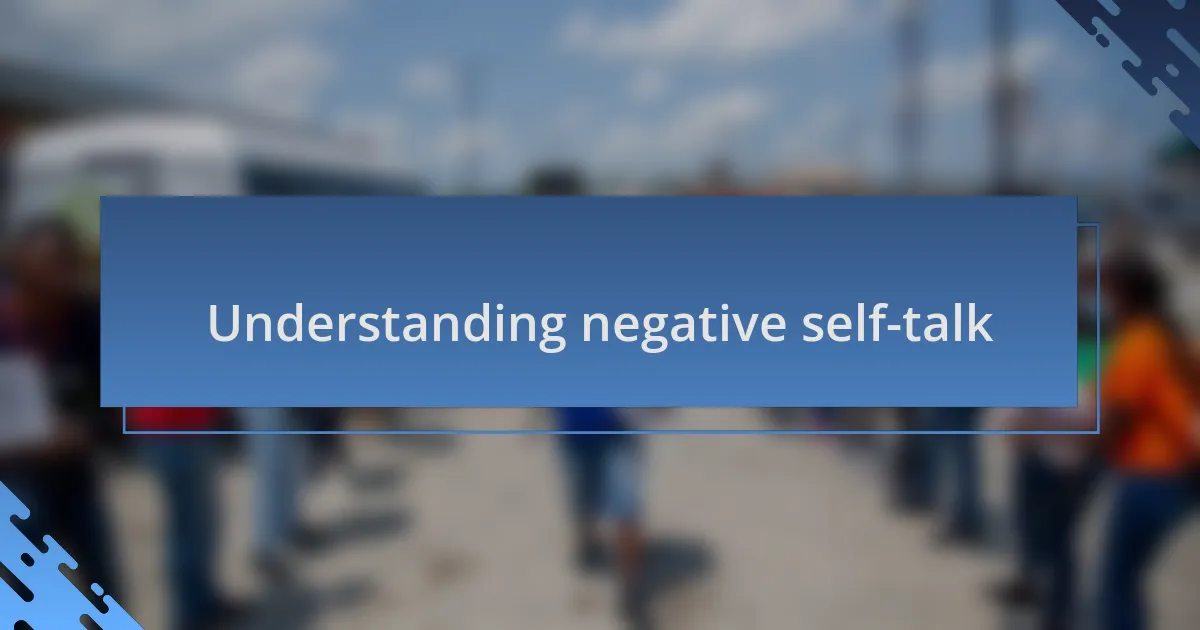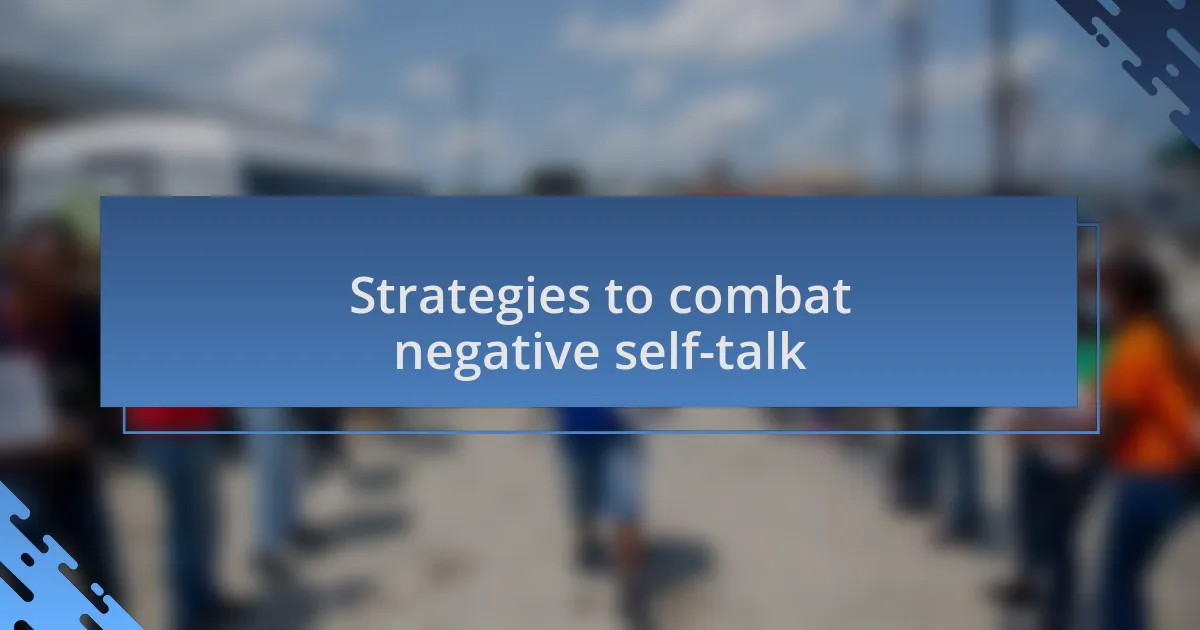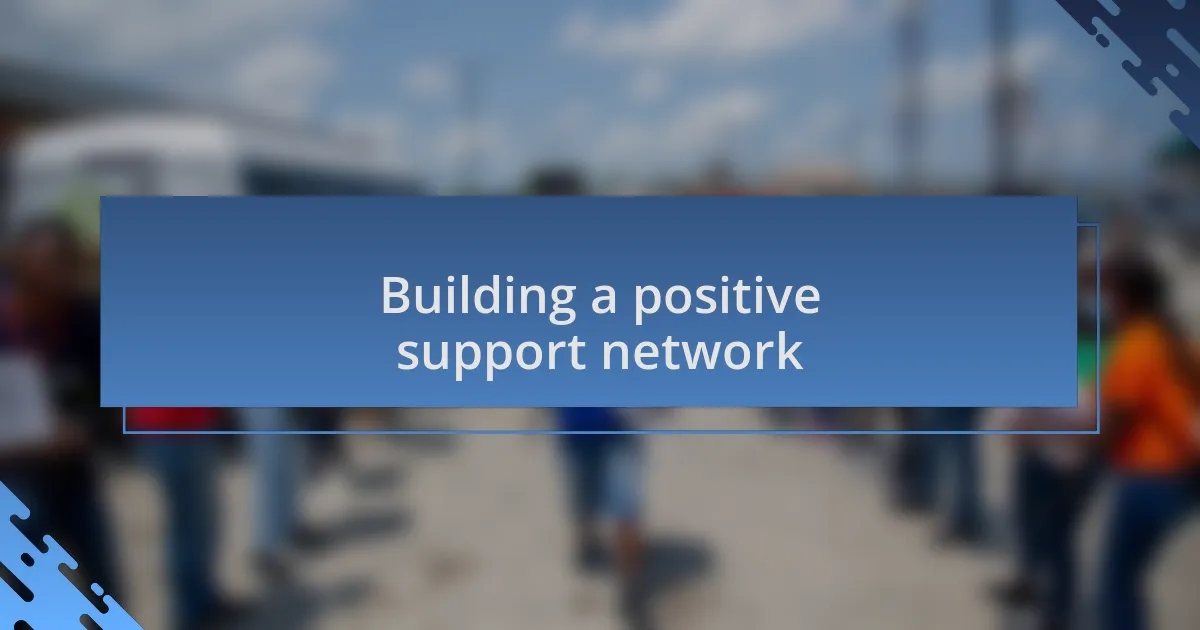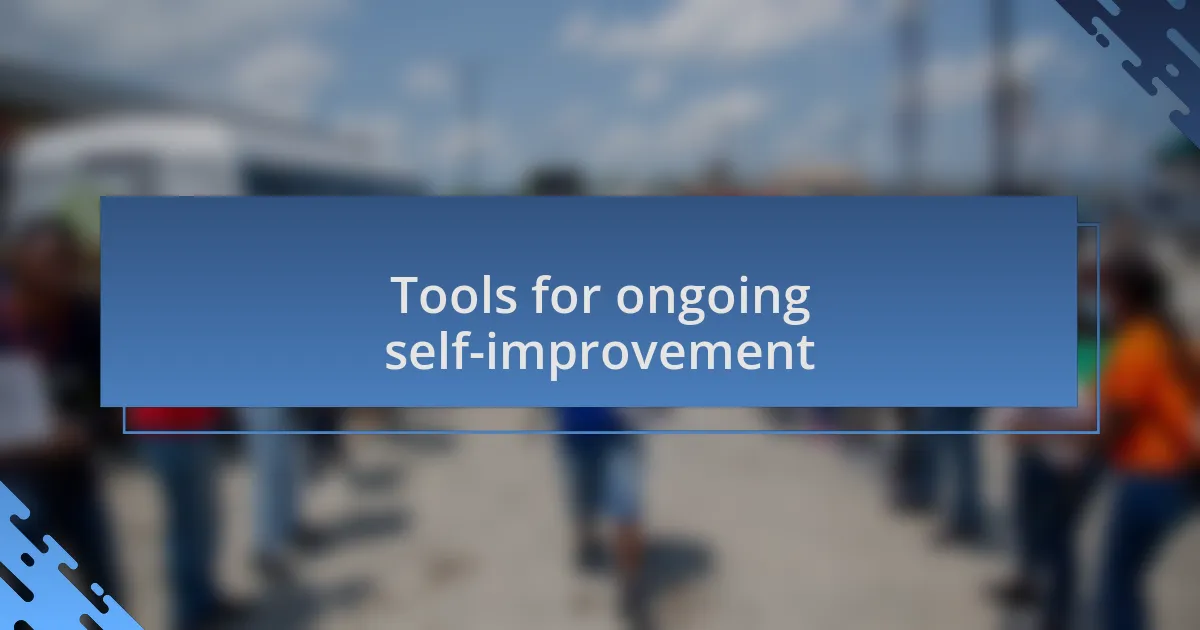Key takeaways:
- Negative self-talk manifests as harsh criticism and can amplify insecurities, particularly in vulnerable moments.
- Practicing self-compassion, using positive affirmations, and mindfulness techniques can help combat negative self-talk.
- Building a positive support network can significantly shift one’s mindset, providing encouragement and shared experiences.
- Tools like journaling, mindfulness meditation, and seeking feedback from trusted individuals are valuable for ongoing self-improvement.

Understanding negative self-talk
Negative self-talk is an internal dialogue that often manifests as harsh criticism and doubt. I remember feeling trapped in a cycle where every small mistake echoed in my mind, amplifying my insecurities. Have you ever caught yourself thinking, “I’ll never get through this,” instead of focusing on your strengths?
This kind of thinking can be insidious. It’s like a shadow that follows you around, whispering discouragement when you need support the most. I once thought I was a failure for simply not fitting into a conventional mold, completely ignoring my unique talents and potential. How often do we underestimate the power of our own voice?
Understanding negative self-talk involves recognizing its patterns and triggers. I realized that my self-criticism often surfaced during moments of vulnerability, especially when faced with challenging situations. Think about it: how does your inner voice react when you encounter obstacles? Understanding this aspect of ourselves can be the first step toward changing the narrative.

Strategies to combat negative self-talk
One effective strategy I’ve found is to practice self-compassion. Instead of berating myself for mistakes, I ask, “What would I tell a friend in this situation?” This shift in perspective makes a world of difference. I remember a day when I stumbled during a presentation. Instead of dwelling on it, I acknowledged my effort and reminded myself that everyone makes mistakes.
Another approach is to challenge negative beliefs by introducing positive affirmations. Whenever I felt overwhelmed by self-doubt, I would write down positive statements and repeat them daily. It might feel strange at first, but I began to notice a tangible shift in my mood. Have you ever repeated something uplifting enough that it starts to resonate with your heart?
Mindfulness techniques also play a critical role. When I became aware of my negative thoughts, I learned to observe them without judgment. It was like standing on the shore and watching waves crash without getting swept away. I often took a moment to breathe deeply and recenter myself, allowing for a gentler dialogue to unfold within. How has mindfulness helped you combat unwelcome thoughts?

Building a positive support network
Building a positive support network is essential in transforming negative self-talk. I’ve seen how surrounding myself with encouraging individuals can dramatically shift my mindset. For instance, during my toughest moments living on the streets, I found solace in a small group of friends who uplifted me rather than judged me. They reminded me of my worth when I struggled to see it myself. Have you found a community that lifts you?
The beauty of a supportive network lies in shared experiences. When I discussed my challenges with others who had faced similar struggles, it was empowering. I remember one friend telling me about their journey from despair to hope, which inspired me to push through my own battles. Isn’t it amazing how a simple story shared can ignite motivation and resilience in oneself?
I learned that the act of reaching out is just as vital as receiving support. I made it a point to check in on others, too. This exchange not only strengthened our bond but also reminded me that I wasn’t alone in my feelings. Who in your life could benefit from your kindness today?

Personal journey of transformation
As I navigated the whirlwind of negative self-talk, I embarked on a personal journey that felt both daunting and liberating. There was a moment when I caught myself staring into a mirror, recounting all the things I believed I couldn’t change. It hit me then: I was not just battling external circumstances but also my internal narrative. How often do we unconsciously allow our minds to become our worst critics?
Gradually, I discovered the power of reframing my thoughts. I realized that each negative belief held a kernel of truth, but it didn’t define me. For instance, when I told myself I was unworthy, I started replacing that thought with “I am deserving of love and support.” This shift didn’t happen overnight; it took consistent practice and reflection. Have you ever attempted to rewrite the script of your own mind?
Through this journey, I learned to embrace vulnerability as a source of strength. Sharing my struggles with others not only helped me shed the weight of shame, but it also built a bridge to deeper connections. I vividly recall confiding in a mentor who, with a simple nod of understanding, helped me see that my experiences were valid and valuable. Isn’t it remarkable how sharing your truth can create a ripple effect of empowerment for others?

Tools for ongoing self-improvement
One of my favorite tools for ongoing self-improvement is journaling. Every morning, I set aside just ten minutes to write down my thoughts. This simple act has become a sanctuary for me, allowing me to explore my feelings and track my progress over time. Have you ever realized how much clarity can come from putting pen to paper? It’s like having a heart-to-heart conversation with yourself.
Another impactful tool I’ve incorporated is mindfulness meditation. I started with just five minutes a day, focusing on my breath and letting thoughts come and go. This practice has taught me to observe my inner dialogue without judgment, helping me detach from negative self-talk. How often do we let our minds spiral into anxiety and negativity? Through mindfulness, I’ve learned to respond rather than react, creating space for healthier thoughts.
Lastly, I found immense value in seeking feedback from trusted friends and mentors. When I feel overwhelmed by self-doubt, I reach out to someone who can offer a fresh perspective. Sharing my struggles fosters connection and often reveals truths I might not see on my own. Have you asked someone you trust for their honest opinion lately? I can promise you, their insights could shed light on the strengths you possess that you may overlook.